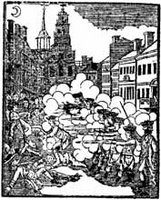Newton Prince: Massacre witness
 Newton Prince was among the most valuable witnesses for the defense in the trials that followed the shootings on 5 March 1770, called the "Boston Massacre." Prince was a businessman in the North End of Boston. He was also unusual in being a black businessman with his own shop. Sources from a few years' apart label him a pastry-cook and a "lemon merchant." In any case, he was definitely not enslaved.
Newton Prince was among the most valuable witnesses for the defense in the trials that followed the shootings on 5 March 1770, called the "Boston Massacre." Prince was a businessman in the North End of Boston. He was also unusual in being a black businessman with his own shop. Sources from a few years' apart label him a pastry-cook and a "lemon merchant." In any case, he was definitely not enslaved.
Trial notes by special prosecutor Robert Treat Paine and someone working for Lt. Gov. Thomas Hutchinson, along with Prince's own later petitions to the government, preserve some more details. He identified himself as a member of the “South Church”—probably the very large Old South Meeting. Paine apparently wrote down that Prince was from the West Indies, but a 1781 document in the British National Archives says he was “a native of Boston in America.” He was born in 1733, making him about thirty-seven years old in the year of the Massacre.
Prince testified in the two separate trials of Capt. Thomas Preston and the British soldiers under him. The anonymous notes on his evidence at Preston's trial can be found on this page. Here's what Newton Prince had to say at the soldiers' trial, taken down by a shorthand expert, John Hodgson, working for Loyalist printer John Fleeming. (Paragraph breaks added for easier web reading.)
When the bells rung I was at my own house, I run to the door and heard the cry of fire, I put on my shoes, and went out, and met two or three men, asked where the fire was; they said it was something better than fire.My earlier posting on Newton Prince catches him three years later, lobbying a legislator for civil rights. Sooner or later I'll post on what happened to him during and after the war.
I met some with clubs, some with buckets and bags, and some running before me with sticks in their hands; I went to the Town-house, looked down the street, and saw the soldiers come out with their guns and bayonets fixed: I saw Capt. Preston with them; there were a number of people by the west door of the Town-house, they said lets go and attack the Main Guard, some said for God’s sake do not meddle with them; they said by God we will go, others again said do not go.
After a while they huzzaed and went down King-street; there was a number of people came down Prison-lane, and some from the Post-office; they went down to the Custom house, and I went down.
The soldiers were all placed round in a circle with their guns breast high. I stood on the right wing, when the Captain came the people crouded in on him to speak to him, and I went behind them, I went next to the Custom-house door, there were people all round the soldiers.
Q. How near were the people to the soldiers?
A. About three or four feet from the point of their bayonets, the thickest part was by Capt. Preston. When I got to the corner I saw people with sticks striking on their guns at the right wing. I apprehended danger and that the guns might go off accidentally. I went to get to the upper end towards the Town house, I had not got to the center of the party, before the guns went off; as they went off I run, and did not stop till I got to the upper end of the Town-house.
Q. How many did you see strike upon their guns?
A. I cannot tell how many of them did it.
Q. Did you hear at that time they were striking, the cry of fire, fire?
A. Yes, they said fire, fire damn you fire, fire you lobsters, fire, you dare not fire.
Q. Did you see any thing thrown at the soldiers?
A. Nothing but snow balls, flung by some youngsters.

5 comments:
That's some interesting history. I'm looking forward to your next post.
Hmm...interesting
Thanks, this is really helping with my history project!
My teacher provided us with a cut-down version of this; thanks so much for posting the full one. An excellent source to use for my essay on the Boston Massacre.
this really helped me with my mock trial in school Thank You
Post a Comment